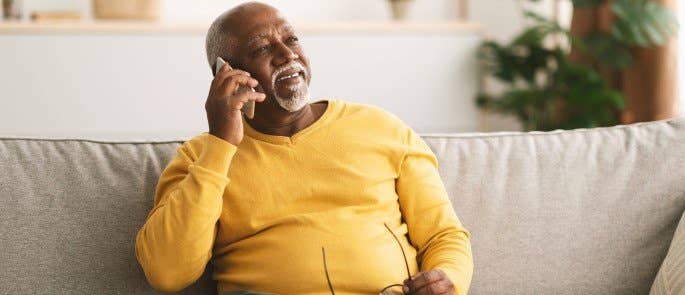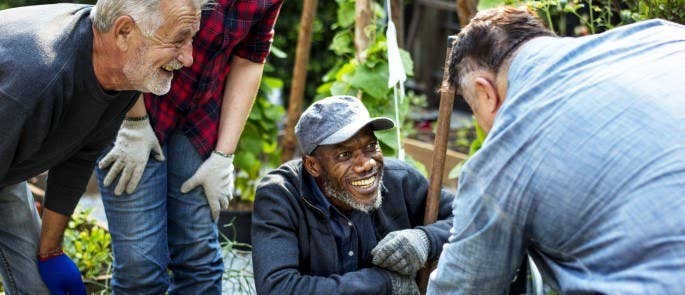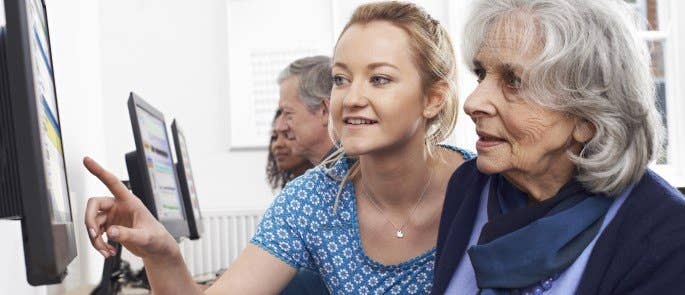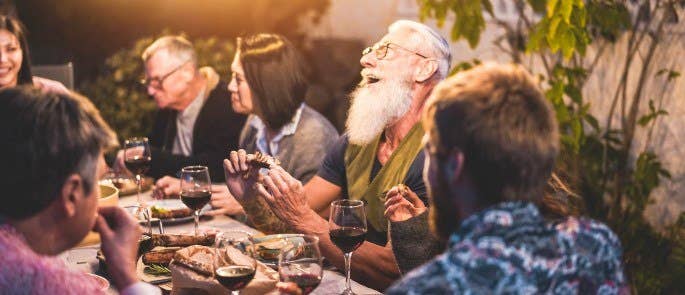How to Combat Loneliness in Older People
Loneliness is something that can affect anyone – at any stage of their life – but can be particularly prevalent in older people. In 2018, research by Age UK put the figure of people over 50 experiencing loneliness at 1.4 million and projected a rise to 2 million people by 2025, if the issue was not successfully tackled.
In this article we will consider the impact of loneliness and the relationship it has with social isolation, looking at how this might affect older people in particular. We will then consider some measures that you could take to help combat loneliness – whether you are an older person experiencing this yourself, a friend, relative or carer, or a professional working with older people that you suspect may be lonely.
Why is it Important to Address Loneliness?
Feeling lonely frequently is linked to early deaths. Its health impact is thought to be on a par with other public health priorities like obesity or smoking.
A Connected Society, HM Government
Loneliness can be hard to define – the experience of it, its causes and the effects it has are personalised. Not only does the experience differ between individuals, but each of us may experience loneliness differently at different stages of our lives.
However, there are some very definite negative consequences associated with loneliness, and combating it is a national priority (the national Loneliness Strategy was published in 2018).
Research shows that those experiencing loneliness are likely to have an increased risk of:
- Higher levels of inactivity.
- Smoking, or exhibiting risk-taking behaviour.
- Coronary heart disease or stroke.
- Depression, stress and low self-esteem – sometimes resulting in a lack of interest in self-care or one’s own wellbeing.
- Sleep problems.
- Cognitive decline and Alzheimer’s.
If someone experiences loneliness for a prolonged period, then they can lose confidence in themselves and lose trust in others. This then makes it even more difficult to establish and maintain connections that might be protective factors against their loneliness – resulting in a negative cycle that can be hard to break.
Loneliness and Social Isolation
These concepts are often talked about together or used interchangeably but, whilst there can be significant overlap, loneliness and isolation are different things. Loneliness is the feeling, fear or perception of being alone or separated, whereas isolation is the lack of social contacts and having few people to interact with regularly.

It is true that as our world has become more ‘connected’ online, the potential for everyday social interaction has declined for many people. As the strategy points out, it is now possible to work, shop, arrange travel, access public services and organise many aspects of daily life, all without speaking a single human being. Add to that the shift in our social behaviours that came with the pandemic and it is easy to see how many individuals (of any age) can be socially isolated.
It is possible to be isolated without feeling lonely, just as it is equally possible to experience loneliness whilst seeming to have a wealth of social contacts. For this reason, we need to be able to spot signs of loneliness in ourselves and others.
What is Social Isolation in Older People?
The Campaign to End Loneliness highlights that half a million older people go at least five or six days a week without seeing or speaking to anyone at all, with 59% of those aged 85 and over, and 38% of those aged 75 to 84, living alone. As the Centre for Aging Better points out, many of these people now do not have the traditional family structures that were often relied upon historically in later life.
Older people can be more prone to social isolation leading to loneliness than younger people, for a variety of reasons.
Of the list of life changing events listed by the government that might make people more vulnerable to feeling lonely, the majority of them are even more likely to apply to our later years.
These include:
- Moving home.
- Losing a job.
- Retirement.
- Becoming a carer.
- Bereavement – including losing a life partner.
- Being a victim of crime (older people are more susceptible to some crimes).
- Experiencing discrimination.
- Entering a period of ill health.
- Living with a disability.
- Moving into care.

In addition to this, as the Centre for Aging Better points out, once an older person is no longer able to use personal transport (for whatever reason), they can find themselves physically isolated and reliant on others to be able to get out and about. Coupled with the fact that many local community facilities are not as readily available as they once were (for example, 800 local libraries have closed over the last ten years), this can seriously limit the potential for social activity.
Signs of Social Isolation in Older People
There is still a perceived stigma to admitting that you are lonely – despite many campaigns over recent years to promote discussion about the issue. Older people in your life might not feel comfortable letting you know that they are experiencing loneliness, so it is important that you are alert to other signs of social isolation and loneliness.
These might include:
- Neglecting their personal care, including their personal hygiene.
- Not eating properly.
- Changing their routine – for example, staying in bed later than they would usually.
- Expressing low self-esteem.
- Generally not seeming their usual self.
As we have seen, the effects of loneliness can be detrimental to a person’s health. The signs above can also have a knock-on effect. For example, if an older person stops feeding themselves properly, then they can become malnourished, meaning that they are more at risk of a range of illnesses.
How to Help Combat Loneliness in Older People
Key to helping someone with loneliness is increasing the connections that person has, and is able to access. Everyone can play a role in tackling social isolation and loneliness – including the individuals themselves, neighbours, friends, family members, faith organisations, professionals and health services.
Top 10 Tips for Combating Loneliness in Older People
These tips are written from the perspective of someone wishing to help someone else who might be experiencing loneliness. However, they are also useful strategies to adapt if you are an older person experiencing loneliness.
1. Make time to chat
This could be pausing to say hello and pass the time of day with a neighbour, or visiting or phoning an older relative for a chat. If you can’t chat in person, speaking on the telephone, or via video call, is preferable to texting, as you will be able to judge better how they are feeling, by their tone of voice, etc.
Very simple interactions can help us to feel more connected and lessen social isolation.

2. Embrace volunteering
This can work in a range of ways. Older people putting themselves forward as volunteers can be hugely beneficial, as it provides them with a purpose for social interaction, access to a wider variety of contacts and also enables them to reap the positive effects on their own wellbeing of helping others.
There are many local organisations looking for volunteers and something can be found to suit someone’s interests, abilities and time available. The Royal Voluntary Service can be a good starting point to find out about opportunities.
If you are someone seeking to support older people in your local community, then volunteering through organisations such as Age UK or Re-engage could be a rewarding option. Opportunities include befriending services, practical opportunities to support, running social events or offering telephone support. Charities will offer support and training to enable you to provide effective support, and will have procedures in place to ensure the adults they support are properly safeguarded.

3. Ask if you can help with errands
Offering practical help can be particularly useful. This could be doing some shopping, posting parcels, helping with the garden, clearing paths, taking bins out, etc. However, do be mindful how you offer help – especially if you are not well-acquainted with the person.
To assume that all older people need practical help would be conforming to stereotypes and an ‘out of the blue’ offer might not be appreciated. Some older people experiencing loneliness may be less likely to trust others and may actually perceive an unsolicited knock on the door as a threat.
4. Encourage digital inclusion
Digital inclusion – making sure that everyone has access to the internet in order to be digitally connected – is a priority of the Tackling Loneliness Network’s action plan. This includes plans to offer affordable broadband plans for older people on lower incomes (almost 1 in 5 people of pension age were living in relative poverty in 2019/20).
Offering to help older people that you know to build their digital skills could be a powerful way of helping them build connections. Some older people are less familiar with online communications and may appreciate some guidance. Do remember to be patient and to not overload your learner with too much information at once, as this can be overwhelming. Break things down and plan a few sessions – not only will this lead to more effective learning but it provides regular social interaction with a focus.

Guidance for keeping safe online should always accompany any tutorials for using particular platforms, as everyone is susceptible to online risk.
Alternatively, you could make older people you know, who might benefit from it, aware of the information and support regarding technology provided by Age UK, or help them find some dedicated online or in person training.
5. Share contact details
This is a simple thing to do but one that could prove to be an important lifeline for a socially isolated person in later life. Make sure that your older neighbours or relatives have access to all the emergency phone numbers they may need, including your own. If the person has any problems whilst home alone they can give you a call, assured that you’re nearby and are willing to help.
You can also make older people you know aware of lines such as The Silver Line that they can call. The Silver Line is free, confidential and operates 24 hours a day, with volunteers providing friendship, conversation and support for older people over the phone.
6. Share details of community groups and activities
Research conducted by the Centre for Aging Better found that many older people were unaware of the support available to them, including social groups that they might be able to access.

Depending on how well you know the person you are wishing to support, you can research groups available in their local community that reflect their interests and circumstances – or provide a broad variety of information. This could be an activity particularly geared at the older community, including intergenerational programmes, or something general for all ages, such as walking groups, faith groups, choirs, ‘knit and natter’ sessions or history society meetings. A regular activity to attend can provide an opportunity to meet new people, learn new things and establish more connections.
If they are unsure about going at first, offer to go along with them to try it out (or join yourself). It might be that they try a few groups before finding something that suits them.
7. Offer lifts
Giving up personal transport, for health, financial or other reasons, can have a huge impact on an older person. It diminishes independence and as a result can shrink a person’s world.
Depending on where they live, there may be good public transport links, with funding schemes for older people, but many people find themselves isolated due to lack of transport.
Be mindful of this and offer to take a neighbour or relative to their weekly club, appointment or religious group. Alternatively, you could volunteer for a local service providing transport to older people in the area.
8. Share something delicious
Invite older friends, relatives and neighbours to share a meal with you occasionally. As we have seen, loneliness often results in not eating properly, so asking someone for dinner or lunch or even over for a cup of tea and a slice of cake, not only provides some social interaction but also could make sure that person is benefiting from some home-cooked meals.

Similarly, if you visit an older person, take a gift of a few portions of something easy to freeze – such as lasagne, casserole or even a roast dinner – that they can eat at a later date.
9. Avoid cancelling plans
This is a simple tip but one that carries more weight than you may think. If you’ve offered an older relative or neighbour a lift somewhere, told them you’ll pop round tomorrow or promised you’ll call on Thursday then always stick to your plans. The older person may be relying on this upcoming interaction, so avoid cancelling at the last minute unless it’s essential.
10. Value the friendship and companionship of older people
This may possibly be the most important tip. Our drive to support older people should come from recognising that they are a vital part of our community and valuing their contribution. It should not be based on ageist assumptions or patronising notions built on stereotypes. You will gain as much from building social interactions with the older people in your life – or meeting new older people – as they will.

Loneliness is something that anyone can experience. By openly talking about it and reducing the stigma, we can begin to combat some of its causes and effects. Older people are more likely to experience loneliness, due to various circumstances, but friends, relatives, neighbours, carers and professionals can all play a part in empowering and supporting older people to combat loneliness.
Further Resources:
- How to Promote Empowerment in Health and Social Care
- How to Help Someone with Loneliness
- How to Become an Activities Coordinator in Health and Social Care
- Mental Health Awareness Training







